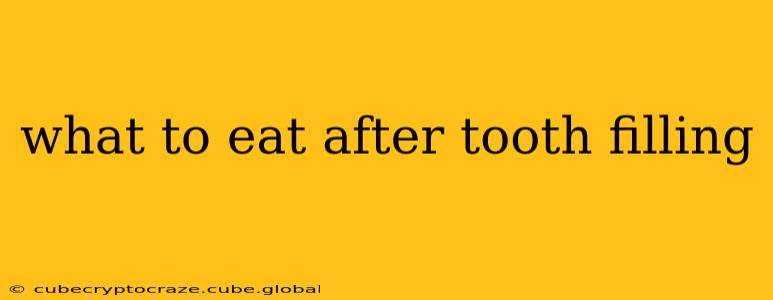What to Eat After a Tooth Filling: A Guide to a Smooth Recovery
Getting a tooth filling is a common dental procedure, but knowing what to eat afterward is crucial for a comfortable recovery and to protect your newly placed filling. The immediate period after the procedure is particularly sensitive, so choosing the right foods is key to preventing irritation and ensuring the filling sets properly. This guide will cover everything you need to know about your post-filling diet.
What should I eat immediately after getting a filling?
The first few hours after your filling are the most critical. Your mouth will likely be numb, and the area around the filling might be tender. Focus on soft, cool foods that require minimal chewing. Good options include:
- Smoothies: Blend fruits, vegetables, and yogurt for a nutritious and easy-to-consume meal.
- Applesauce: A classic soft food choice that's gentle on your teeth.
- Yogurt: Provides protein and calcium, important for healing. Choose plain varieties to avoid added sugars.
- Mashed potatoes: A comforting and easily digestible option.
- Oatmeal: Choose a plain variety and avoid hard toppings.
What foods should I avoid after a tooth filling?
Certain foods can put extra stress on your filling or irritate the sensitive area. Avoid these for at least 24 hours, and ideally longer:
- Hard or crunchy foods: Things like nuts, hard candies, popcorn, and ice can damage or dislodge your new filling.
- Sticky foods: Taffy, caramels, and gummy candies can get stuck in the filling and increase the risk of cavities.
- Extremely hot or cold foods: These can cause sensitivity and discomfort around the filling.
- Chewy foods: Tough meats, bagels, and other chewy foods require excessive chewing, potentially harming the filling.
How long should I stick to a soft food diet after a filling?
While you should avoid hard and sticky foods for at least 24 hours, you can generally resume your normal diet after a few days. However, it's wise to continue to be mindful of what you eat for a week or so to allow your mouth to fully heal and the filling to properly bond with your tooth. Pay attention to any lingering sensitivity; if you experience pain or discomfort, continue with softer foods until the sensitivity subsides.
What if I accidentally bite down on something hard?
Don't panic! If you accidentally bite on something hard, check your mouth carefully. If you notice any damage to the filling (like a chip or crack), contact your dentist immediately. Early intervention is key to preventing further problems.
Can I drink alcohol after a tooth filling?
Alcohol can dehydrate you, which is generally not ideal for healing. It's best to avoid alcohol for at least 24 hours after the procedure, especially if you’ve taken any pain medication. Always follow your dentist’s specific post-operative instructions.
What if I'm still experiencing pain after a few days?
Lingering pain after a few days could indicate a problem with the filling or an infection. Contact your dentist to schedule a follow-up appointment.
Are there any specific foods that can help with healing?
Focusing on a nutrient-rich diet will support your body's natural healing process. Include plenty of fruits, vegetables, and protein in your diet. Foods rich in Vitamin C and calcium can aid in tissue repair.
By following these guidelines and paying attention to your body's signals, you can ensure a smooth and speedy recovery after your tooth filling. Remember, consulting your dentist directly with any concerns is always the best course of action.
